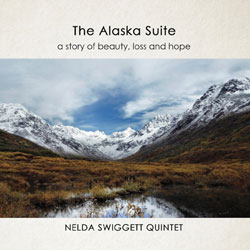
Nelda Swiggett Quintet
The Alaska Suite
Self-released

Pianist and composer Nelda Swiggett debuted her 9-song Alaska Suite on Earth Day in 2017. Along with her husband, trombonist Clif Swiggett, the bandleader has presented the music in multimedia performances that depict the accelerated climate change in Alaska. Teaming up with her quintet, including Chris Symer (bass), Adam Kessler (drums), and Julian Smedley (violin), Swiggett recorded the suite in 2018 at David Lange’s studio.
A set of vibrant lyric pieces for a landscape’s sublime degeneration, the result is a well-choreographed combination of Swiggett’s colorful arrangements and her group’s collaborative electricity. The pianist establishes the tone with her bluesy touch on the opening track, “Alaska,” summoning the enormous skyline of the state. After setting the scene, the group portrays warmed ice in “Melting.”
The modal cooker “Burning” depicts extensive fires through Swiggett’s brass and Smedley’s flaring phrases, tumbling into Kessler’s flashing pyrotechnics. But the group really gets going on “Homeless,” smartly characterized by its odd tempo (7/4) and unrelenting pace, before a great thematic use of free improvisation’s unsuspected synergies on “Havoc.”
The last third of the album takes a more psychological turn. “Hope Springs Eternal” flows out before a Weather Report-style groove, a framework that later allows for moody hits between solos (apparently, hope must break ground before it springs). That thing with feathers, “First Flight,” follows, a finale that jumps suddenly downwards, then builds back up to a cruising montuno figure. Well-tuned together, the band finishes the “tune without the words” on a chord (D7 flat four) that truly perches on the soul.
But the Swiggett and her band aren’t really silent. Given the scope of the issue, musicians certainly have their expressive work cut out for them. Still it’s wise of Swiggett to voice, on a spoken word section of “Worry,” the wish to go back as we “strive for answers, make goals, then relapse into comforts and denial.” Music can hold a mirror to our nature, but it can also give testimony to this fluid now, a story far from past.–IAN GWIN